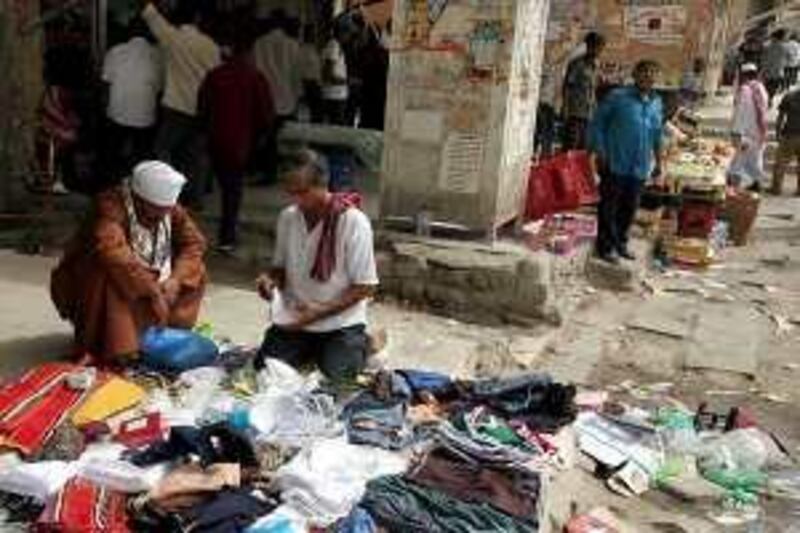KUWAIT CITY // As Muslims across Kuwait celebrated Eid al Fitr with a week of holidays and family gatherings, Bangladeshis living in the country's impoverished slums went about their routines with little change, but in the hope that a proposed labour law that will be voted on in parliament after it restarts next month will help improve their lot. The new law would replace the existing 1964 labour law and expand a number of rights for workers, including annual leave, sick leave and maternity leave. It is seen as an attempt to improve conditions for low-paid workers, many of whom have suffered under the existing sponsorship system - which has led to Kuwait being put on the lowest tier of the US State Department's most recent Trafficking in Persons report - and improve Kuwait's international reputation.
In Jleeb al Shuyoukh, one of Kuwait's poorest areas, many of the residents illegally work two jobs or non-sponsored jobs to earn enough money for their families back home. During Eid, it was business as usual. The majority of men in the teeming, littered streets are from Kuwait's 200,000-strong Bangladeshi population - one of the worst-paid groups in the country. "I'm lucky to share a room with just two other people, others have a salary of 15 or 20 dinars [Dh190-260] and have to share a room with 15. They have a tough time," said Billal, a Bangladeshi in his late 20s who works 12 hours a day in a grocery for 100 dinars a month.
"I'm not doing anything special for Eid, just working as normal. After work I rest, watch TV and pray. It's the same thing every day of the year, there's nothing to do here," said Billal, who visits his family once for two months every two years. The ethnicity of the residents, Bengali signs and shabby concrete buildings give Jleeb al Shuyoukh the atmosphere of a subcontinental city. In its narrow, unpaved alleys racketeers sell table after table of copied Bollywood films.
But at night, the area is known in Kuwait for prostitution. Police raids on brothels and liquor dealers are often reported in the local press, giving Jleeb al Shuyoukh and its residents a reputation for crime. Tensions over pay and conditions have also erupted before in Jleeb al Shuyoukh. Last year, hundreds of mainly Bangladeshi workers rioted for three days, burning out cars and shops, the Kuwait Times reported. More than 1,000 people were deported because of the trouble, but others said their conditions improved.
In last year's election campaign, the Islamist MP Mohammed al Hayef blamed the country's Bangladeshi workers for a crime wave and called for tens of thousands of them to be expelled. Two-thirds of Kuwait's population of three million is made up of foreign workers - mainly from South and South East Asia - and about 75 per cent of them are unskilled. The US state department's Trafficking in Persons Report 2009 said workers from Nepal, India, Sri Lanka, the Philippines, Indonesia, Pakistan and Bangladesh are subject to conditions of forced labour such as the withholding of passports, confinement, physical and sexual abuse, and non-payment of wages. It said Kuwait's government is "not making sufficient efforts" to eliminate trafficking.
A Bangladeshi shop owner, Kazi, said all of the local businesses are employing their staff illegally because the government wants to demolish the area and build a commercial centre, so it is not issuing new licences. He said this leaves the employees open to abuse. "Sometimes, groups of Kuwaitis come into the shops and ask my employees for their civil ID cards, we are afraid of them," he said. "Once, when he couldn't produce it, they took him away in their car until he gave them his money. On that occasion he gave them 1,200 dinars. He didn't go to the police because he would just have ended up in more trouble."
Another Bangladeshi, Harun, works for a private company that is contracted to supply staff to one of the ministries from 8am to 2pm on weekdays. He then works illegally in a shop from 4pm to 11pm seven days a week. Each job pays 40 dinars a month. He said during Eid he is off from his first job and he gets together with his friends to eat and watch television. "But everybody who works in the ministry is suffering from stress because we haven't been paid in five months," Harun said.
"I can change jobs, but the company will ask me for 400 dinars," he said, making a complaint that is regular among foreign labourers. The practice of visa trading is a common abuse of Kuwait's sponsorship system. Some companies charge their employees to move jobs and other "ghost" companies are set up to import workers without providing any jobs at all. It is the equivalent of selling them a visa.
"The money I would get for working in Bangladesh is the same these days, but there is so many people that it's almost impossible to find a job, so I want to stay. "But the situation with the salaries is terrible, some of the staff is talking about going on strike after Eid," Harun said. jcalderwood@thenational.ae





